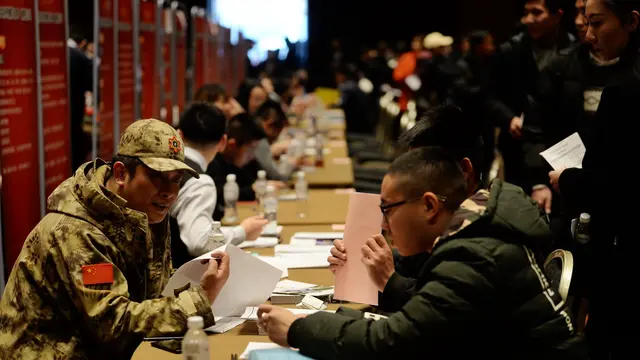China has pledged to continue strengthening policies to prioritize employment in the face of elevated challenges facing the country's employment market.
Li Zhong, vice minister of the Ministry of Human Resources and Social Security, on Thursday said the government will continue to support the job market by utilizing fiscal, monetary, industrial and other policies.
It will also encourage entrepreneurship and focus on ensuring the employment of college graduates, migrant workers, and those with employment difficulties, said Li.
Li was speaking at a press conference on Thursday where authorities gave a summary of the country's progress and achievements on employment and social security over the last 10 years, since the 18th Communist Party of China (CPC) National Congress in 2012.
The urban and rural employment trends have undergone historic changes over the past decade, Li said.
In 2014, the proportion of employees in urban areas exceeded that in rural areas for the first time, and the proportion reached 62.7 percent in 2021, an increase of 13.8 percentage points over 2012.
China's employment structure has also been continuously optimized with the proportion of employees in the tertiary industry increasing from 36 percent in 2012 to 48 percent in 2021, he said.
The overall employment level of more than 80 million college graduates has remained stable over the past decade. The total number of migrant workers has increased to 290 million, while the number of workers taken out of poverty has remained above 30 million.
Workers at a clothing factory in east China's Jiangsu Province, August 25, 2022. /CFP
Despite these achievements, considerable challenges remain. As the most populous developing country in the world, China's employment has always been under pressure, said Li. He noted that uncertainties have increased.
In 2021, China added 12.69 million new jobs in cities and towns. It's estimated that there are currently about 800 million employees in China, including most of those new college graduates of 2022.
With so many well-educated, skilled and hard-working people employed in different sectors, China has enriched itself economically, culturally and scientifically.
As China's economy gets stronger and more prosperous, the whole world benefits. But with a great number of young people still without jobs and finding it difficult to support themselves, it has become a headache for China.
China's youth facing record-high unemployment rate
China's national urban surveyed unemployment rate has been falling, dropping to 5.4 percent in July from May's 5.9 percent, data from the National Bureau of Statistics (NBS) showed. However, China's youth continues to be a segment of the population facing employment pressures.
In July, a large number of fresh graduates entered the job market, pushing up youth unemployment. The unemployment rate of urban youth aged 16 to 24 hit a record 19.9 percent for the month, an increase of 0.6 of a percentage point from June.
China's Ministry of Veterans Affairs (MVA) held a press conference on "China in the Past Decade" on Friday, introducing the high-quality development of veterans affairs since the 18th National Congress of the Communist Party of China (CPC).
Under the cordial care of the president and the CPC Central Committee's leadership, China has taken a series of measures to improve the benefits for veterans and families of military members, as well as strengthen the education and training for veterans to make them more competitive in the job market, said Ma Feixiong, vice minister of Veterans Affairs.
Since the establishment of China's Ministry of Veterans Affairs in 2018 and the National Veterans Service Center in 2019, veteran service centers or stations have been set up at every administrative level from community to province. Last year, more than 600,000 veteran service centers were established to facilitate the resettlement and employment of former soldiers.
The official said that veterans are encouraged to help with the economic development. Over the past four years, more than 2.26 million veterans have successfully found jobs or set up their own businesses.
Over 1.85 million veterans have been resettled through the help of the ministry with most finding positions at government agencies, the official introduced.
The ministry will improve and diversify the skills training for veterans to help them better adapt to the change of their roles after retirement, according to the official.
China has pledged to improve the welfare of and benefits for its military veterans in its latest five-year plan from 2021 to 2025, aiming to broaden their employment opportunities.
To better protect the legitimate rights of veterans, the first law for veteran affairs was introduced in 2020. The law relates to the welfare of veterans, including their resettlement, education and training, as well as relevant certificates for preferential treatment.
The law, which was put into effect in 2021, offers preferential financing policies for veterans. For instance, veterans can get discount interest on loans for starting small or micro-businesses. Businesses that employ former soldiers are also given tax breaks.
During the press conference, officials noted that progress has been made in the application and issuance of preferential treatment certificates for veterans and said they will further promote the digitalization of these certificates.
Since the launch of preferential treatment certificates for veterans in December 2021, more than 200,000 applications have been approved as of March, according to the ministry.
The ministry this year also launched a special project to help veterans in difficulties. Nearly 10 billion yuan were raised through multiple channels, benefiting 32 million veterans. Measures were also introduced to ensure veterans with disability have priority in medical institutions, including registration, medicine collection, payment and hospitalization services.
(CGTN)
 简体中文
简体中文

